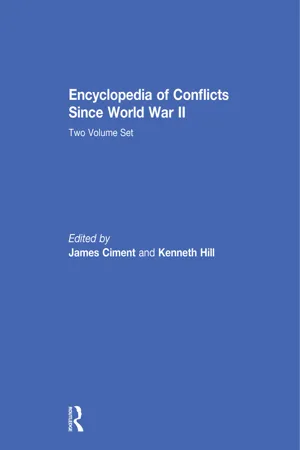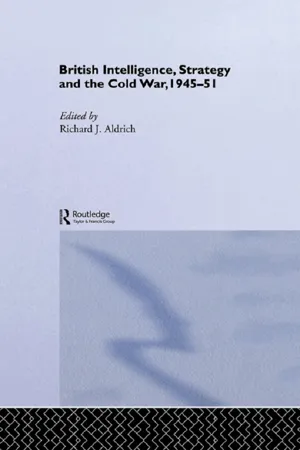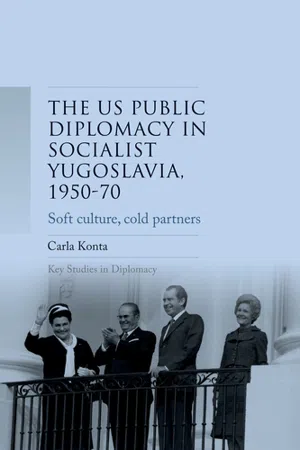Cominform
Cominform, short for Communist Information Bureau, was an organization established in 1947 by the Soviet Union and its Eastern European satellite states to coordinate communist activities and policies. It aimed to promote unity among communist parties and counter the influence of the United States and its allies during the early Cold War period.
4 Key excerpts on "Cominform"
- eBook - ePub
The Greek Civil War
Essays on a Conflict of Exceptionalism and Silences
- Thanasis D. Sfikas, Philip Carabott, Philip Carabott(Authors)
- 2017(Publication Date)
- Routledge(Publisher)
...It never became a decision-making instrument, its role being merely to ‘guide’ and to co-ordinate. Essentially it was an additional valuable tool of Stalinist authority – a component of the communist ideological and political strategy. In the main the Cominform acted as an accredited porte-parole of Soviet policy. According to Andrei Zhdanov’s drawing of the new geopolitical map, which perceived ‘the world as divided into two basic camps’, 7 the Cominform headed ‘the democratic and anti-imperialist camp’. From its very inception, therefore, the immediate political goals of this new organization were formulated as follows: the exercise of Soviet authority in the socialist camp; hardened opposition and mobilization of the masses in the capitalist camp; and a co-ordinated pursuit of the policy of the communist camp for peace. In fact these aims also reflected the Eurocentric dimension of the communist movement in 1945–49, that is, until the victory of the Chinese revolution. 8 Indeed, the invitation to participate in the Cominform’s organizational nucleus to only nine European communist parties 9 demonstrates that Soviet foreign policy focused its interest on Europe, which was then threatened by ‘Marshallization’. The setting up of the Information Bureau was a specific response to the Truman Doctrine and the Marshall Plan, exemplifying the simultaneous entrenchment and controlled offensive with which the communist world chose to counter the American presence in Europe...
- eBook - ePub
- James Ciment, Kenneth Hill, James Ciment, Kenneth Hill(Authors)
- 2012(Publication Date)
- Routledge(Publisher)
...This government willingly cooperated with the Soviet Union. The Cominform In October 1947, representatives of the Soviet Union, Poland, Czechoslovakia, Hungary, Romania, Bulgaria, Yugoslavia, France, and Italy met in Poland and established the Communist Information Bureau (Cominform). The Cominform was a response to the Truman Doctrine and the Marshall Plan. It directed Communist activities throughout Europe to make certain the Marshall Plan did not succeed. Following Stalin's directives, the communists called for strikes, confrontations, and violence in all the countries willing to accept American aid. The primary purpose of the Cominform, however, was to make certain that the Communist parties in Europe followed the foreign policy line dictated by Moscow. The Cominform was an instrument of Soviet control. Stalin would not tolerate Communist regimes in Europe based on nationalism. Popular Communist governments based on nationalism might pursue policies detrimental to the Soviet Union. At the first Cominform meeting in Poland in October 1947, Andrei Zhdanov, a member of the Soviet Politburo and a close confidant of Marshal Stalin, analyzed changes in the international political system that resulted from World War II. He said the world was divided into two camps, one identified with the United States and the other aligned with the Soviet Union. In this bipolarization of power, there was no middle ground. Nations could not be neutral. They had to be in one camp or the other. Furthermore, there could be no other leader in the struggle against the Western powers than the Soviet Union. What this meant was that all Communist political parties had to follow the policies dictated by Stalin. At the time, Yugoslav foreign policies generally paralleled those of the Soviet Union because Tito's priorities were similar to those of Stalin. In February 1948, a coup d'état in Czechoslovakia brought the Czech government under Stalin's control...
- Richard J. Aldrich, Richard J. Aldrich(Authors)
- 2005(Publication Date)
- Routledge(Publisher)
...On 5 October the Soviets had announced the formation of the Cominform, perceived by British officials as the vehicle for subversion of Western European democracies. Bevin informed the Cabinet on 25 November that, ‘if the proceedings at’ the Moscow Conference of Foreign Ministers ‘confirmed his fears, he would have to ask the Cabinet to consider a fresh approach to the main problems of our foreign policy’. 45 After the Conference collapsed in December, Bevin discussed military co-operation and the Western European ‘bloc’ with French Foreign Minister Georges Bidault. 46 On 30 December Mayhew, Sargent, Kirkpatrick, Warner, A. A. Dudley, the head of the Information Policy Department, and A. E. Lambert of the Northern Department considered the presentation of the strategy. Mayhew, authorized by Bevin and Attlee to develop his ideas on ‘Third Force Propaganda’, recommended a ‘Communist Information Department’, which would only be ‘concerned with the provision of information about Russia, about Communist tactics and about the current lines of Communist propaganda which needed to be offset’. Dissemination of British propaganda would be carried out by ‘the existing information machinery’. Sargent countered with the argument for the creation of a special organization for the ‘offensive’ against the Soviets, as the Chiefs of Staff had been ‘urging the desirability of reviewing political warfare machinery and undertaking certain “black” secret operations’...
- eBook - ePub
US public diplomacy in socialist Yugoslavia, 1950–70
Soft culture, cold partners
- Carla Konta(Author)
- 2020(Publication Date)
- Manchester University Press(Publisher)
...Introduction ‘No event could be more momentous for the attainment of our [US] foreign policy objectives than the permanent alienation from the Soviet Union of this key regime.’ 1 These words, spoken by American counsellor R. Borden Reams in Belgrade only a few days after the Tito–Stalin split of June 1948, seemed to capture perfectly the profound significance of that moment. The news about the expulsion of the Yugoslav Communist Party (YCP) from the Cominform erupted on the front pages of worldwide newspapers. Borba, Vjesnik, and Politika – as the main Yugoslav Party’s ‘spokespersons’ – expressed consternation and disbelief. 2 The Information Bureau of the Communist and Workers’ Parties, more commonly known as Cominform (Communist Information Bureau), founded in September 1947 as a political response to the Marshall Plan to unify the European communist parties under Soviet auspices, expelled the YCP from its ranks with the accusation of disloyalty to Marxist and Leninist ideals. In fact, it was Tito’s expansionist ambitions over Greece, Bulgaria, and Albania that irritated the Soviet dictator and caused the Soviet–Yugoslav impasse. 3 Soon it became clear that there was no return from the break-up and no way around its long-term consequences. The Soviet–Yugoslav rupture would lay the ground for the Yugoslav ‘way to socialism,’ its socialist self-management economy, and its non-aligned foreign policy. In the years following 1948, the Yugoslav leadership started searching for new geostrategic partnerships, alliances, and military backing...



